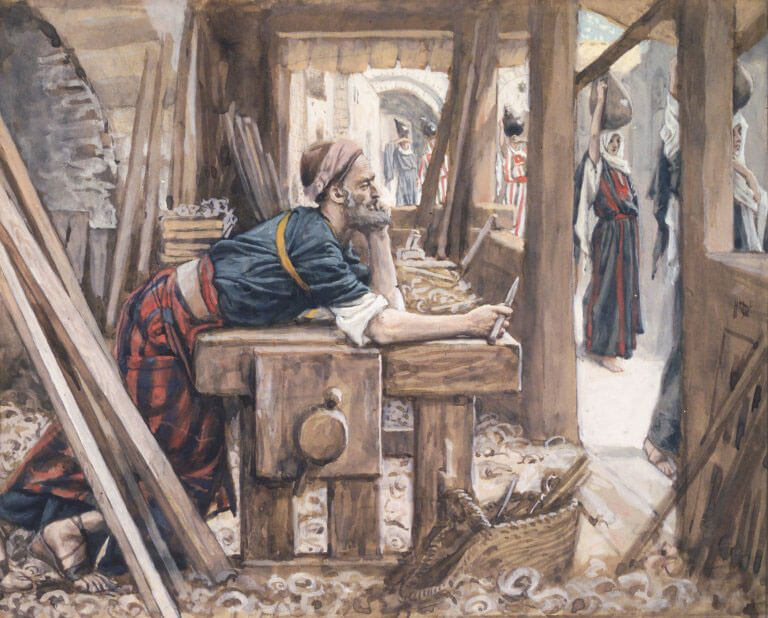In the northern hemisphere, Advent comes to us in the darkest time of the year. Christmas is advertised and celebrated as the happiest time of the year, and for some it is just that. But for others, Christmas is indeed the darkest time, where loneliness seems lonelier, when separation feels more separate, and despair calls our name. For many people it is not “the most wonderful time of the year.”
I remember one particularly bleak season for us, when a member of our family was dying during Advent, whom we went to visit and then stayed for the funeral. We flew home the week before Christmas. There was not one decoration up in our house. I’d had no time for Christmas shopping or baking. I had no energy to do anything. My heart just felt cold and heavy when I listened to the cheery Christmas music playing all around me. All I could think of was the person who was gone, and the suffering that we had watched. Christmas seemed off-key, misplaced, misbegotten.
I still remember being in church on that fourth Sunday of Advent. I had no voice to sing, but I heard my community sing all around me, “O come, O come, Emmanuel, and ransom captive Israel, who mourns in lowly exile here.” These were words I could hang on to: “Disperse the gloomy clouds of night, and death’s dark shadows put to flight.” The people of Israel were a people in chains, under the heavy boot of a Roman occupying army. Many were looking for God, but the prophets had gone silent. Where was God in that darkness?
Dreams delayed
In the Christmas stories, Mary and Joseph both receive revelations, but that doesn’t mean they knew everything. They were still walking in darkness.
I can just imagine Mary the night after the angel has left. She’s lying in bed, thinking about everything that has just happened to her. Suddenly she sits bolt upright: “I forgot to ask the angel, who is going to tell Joseph?” Maybe she hoped Gabriel had paid Joseph a visit at the same time. I can picture Mary looking at Joseph the next day, wondering if he was going to mention the angel visitor. Day in, day out, she waited.
I wonder if Mary agonized, “Should I tell him or not?” I wonder if her prayers were, “Lord, you have to tell Joseph today. Please! Today!” She didn’t want Joseph to be in the dark, but what were the chances of him believing her?
And then the time came when Joseph finds out about the pregnancy. Did he figure it out himself? Did Mary tell him? Did a neighbour share that juicy bit of gossip with him? Or maybe his mother told him, after hearing it at the well. We don’t know how Joseph found out Mary was pregnant. We do know that he decides to divorce her. He feels that the relationship must end.
In the Orthodox tradition, with its many paintings of biblical stories, the story of the birth of Jesus sometimes has Joseph in a corner, looking glum and dejected as someone whispers something in his ear. He is hearing bad news: Mary is pregnant.
If Joseph was dismayed, Mary’s situation was worse. She faced disgrace and the prospect of raising her son without a father. She was gaining a child, but losing a husband, a terrible situation in that time and place. Dark times for both Mary and Joseph.
And then Joseph is sent a dream. He’s told that Mary conceived by the Holy Spirit. And that they are to parent a child who is a Saviour for their people, who will save them from their sins. Suddenly, Joseph sees the light.
I wonder if Joseph or Mary ever wondered, “Why, Lord? Why couldn’t you have told us both the news at the same time? Why did we have to go through that period of darkness? It was so hard for us! Why?”
Recurring dreams about the dark
Not knowing something is often described with that word picture, of “being in the dark.” Darkness is a basic primal human fear. We fear that danger lurks in the darkness. Or if we are travelling in the darkness, we fear losing our way. Will we ever get home?
I have had recurring dreams about darkness. I’ve dreamed I’m driving and need to turn in a certain direction, but it’s entirely dark, I can’t see a thing. Or I’ve had dreams where I’m looking for something but I can’t open my eyes to see. I’m looking and looking, but my eyes won’t open, and I don’t know what’s there. Those dreams are always gripping and scary.
When I worked as a chaplain, I often had to sit with people in times of darkness. Times when they were sitting in a waiting room not knowing if their loved one was going to live or die. Sometimes people would be sitting there brooding, then they would just explode with the comment, “I can’t take this!” Especially as hours turned to days, and days turned to weeks, and someone’s life still hovered in the balance, they’d say, “I can’t take this not knowing. I can deal with whatever happens, I can deal with death, I can deal with life, but I can’t deal with this not knowing.”
Relying on God in the dark
Even though it was stressful, we can see that Joseph and Mary both relied on God in the dark. Mary, even though she probably knew that Joseph was going to divorce her, decided to keep the baby, even though in those times there were undoubtedly ways of making pregnancies end. She decided to go through with this even if everyone deserted her; she would rely on God. And Joseph, even when he was walking in the dark and thought Mary had been unfaithful, didn’t become vindictive and spiteful. He was a righteous man, and resolved to do the right thing, which was to divorce Mary quietly.
Joseph’s dream illuminated his path, but only to a certain extent. The first dream he had didn’t end with the question, “And have you ever thought of moving to Egypt?” Maybe that would have been too much for poor Joseph—the last straw that would have sent him running from the scene saying, “This baby is arriving with too much baggage!”
In the same way, in that first meeting with Mary, Gabriel didn’t say anything about where the baby would be born, and under what circumstances. While Mary knew he would be a Saviour, she wasn’t given all the information. It was when her baby was safe in her arms that Simeon in the temple told her, “And a sword will pierce your soul also.” Mary was in the dark about that statement for Jesus’ whole life. God gives light, but, mercifully at times, also protects us from illumination that would overwhelm us.
Embracing the reality of darkness
Maybe this Advent finds you walking in the dark, taking groping, fearful, tentative steps. Will the medical test results come back positive or negative? Will the bank foreclose on the farm this year? Will my husband come back to me? Will I ever find a job? Is it war or peace? What country will accept our refugee claim? What will climate change look like in 20 years? Is God real? Does God love me?
We live in dark times, where we feel unsure of many things. And it’s a mystery why some receive illumination, and others plod along fearfully in the dark. We don’t know why Joseph’s dream was delayed, or why it took so long for a Saviour to appear.
Yet we worship a God who shows up in the darkest places, places where we think God cannot be. A God of Bethlehem. A God of Aleppo. A God of the nuclear-bomb silo. A God of the torture chamber. A God of the coldest, greediest multi-national corporate boardroom. A God of the person wearing explosives walking into a crowded mall. A God of my heart.
As congregations, as churches, we will gather on the evening of Dec. 24, and the chorus, “O Come, O Come, Emmanuel” will ring out into the night. We join with Jesus, who is also waiting, waiting to be born again in this pregnant darkness—born again in the hearts of all who work for peace.
Carol Penner teaches and writes in the area of practical theology. After many years as a pastor in various Mennonite congregations, she joined the faculty of Conrad Grebel University College this year. Her research interests include feminist theology and Mennonite peace theology, and abuse issues. She has a popular blog of her worship resources at leadinginworship.com.
For discussion
1. Can you think of times when you were walking in darkness, with despair calling your name? What kinds of situations cause us the most anxiety? Mary and Joseph received messages from an angel of God. In what ways did they feel reassured and in what ways more anxious?
2. Carol Penner writes, “We live in dark times, where we feel unsure of many things.” Do you agree? What are the things we are most unsure about? What are the larger forces in the world that have caused society to lose its optimism about the future?
3. Penner describes her return home after a death in the family when she felt that “Christmas seemed off-key, misplaced, misbegotten.” What tips do you have for coping with the festive expectations of the Christmas season if a person is struggling with loneliness or grief? Are our festive expectations too high? Where do these expectations come from?
4. Penner affirms that “we worship a God who shows up in the darkest places.” When has God’s light surprised you? What are some signs of hope that God is at work in your family, in your congregation or in your community?
—By Barb Draper










Leave a Reply
You must be logged in to post a comment.